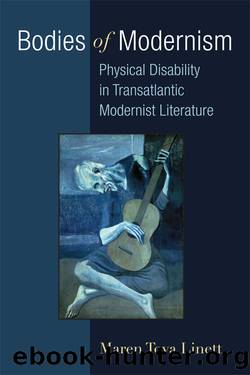Bodies of Modernism by Linett Maren;

Author:Linett, Maren; [Linett, Maren]
Language: eng
Format: epub
Publisher: University of Michigan Press
Bloom assumes that the stains on the striplingâs coat are because he âslobbers his foodâ (8.1096). He compares being blind to the tragic death by fire of a thousand people, mostly women and children, on the General Slocum in 1904: âPoor fellow! Quite a boy. Terrible. Really terrible. . . . Where is the justice being born that way? All those women and children excursion beanfeast burned and drowned in New York. Holocaustâ (8.1144â47; Gifford 186). He does not explicitly express a feeling of thankfulness that he himself is sighted, but this is implicit in his pity for the stripling.23 And he âfall[s] prey to the âamazingâ syndromeâ when he says, âLook at all the things they can learn to do. Read with their fingers. Tune pianosâ (8.1115â16).
But Bloomâs reactions are more complex than this. For one thing, he is making a genuine and spontaneous effort to expand his understanding of perception, to speculate about the perception of blind people rather than assuming they cannot perceive much at all. He also criticizes his own ââamazingâ syndromeâ comments: âOr we are surprised they have any brains. Why we think a deformed person or a hunchback clever if he says something we might sayâ (8.1116â17). This second-guessing is an afterthought, both for Bloom and for Joyce, who did not add these two sentences until after the chapter was set in placards (JJA 18:143). But it does show an awareness of ableist prejudice (avant la lettre) and an effort to correct (though not erase) it. In this effort, Joyce is far more progressive than even some recent critics. Dominic Rainsford, for example, ends his article âPity in Joyceâ this way: âAnd, somewhere in Dublin, Joyceâs blighted and rejected alter ego, Dedalusâs dead alias, the poor blind stripling, is still tapping dismally, foul-temperedly, alongâ (54). Here Rainsford far exceeds Joyceâs ableism by associating blindness with blight and rejection and using the blind character, though Joyce does not, as a metaphor for death.
Although to some extent Bloom infantilizes the stripling when he compares his hand to Millyâs, saying that itâs âlike a childâs hand,â Cormier points out that this can be taken as a moment of connection: âBloomâs infantilizing of the stripling is to be understood in the context of his Odyssean quest to reclaim his fatherhood. This context transforms a seemingly patronizing moment into one of paternal careâ (207). Bloom also grants sexuality to the stripling, refusing more common discourses that desexualize people with disabilities. He muses, âThe voice, temperatures: when he touches her with his fingers must almost see the lines, the curvesâ (8.1128â29). Here Bloom insists on sight as a metaphor for all perception (âalmost seeâ) while at least acknowledging that the stripling is capable of sexual desire and contact. When he thinks, âAnd with a woman, for instance. More shameless not seeingâ (8.1125), the text performs an ambivalence about heterosexuality and the male gaze.24 Shameless is one of those words that can mean opposing things: it can mean brazen, bold (qualities associated with Boylan), unable or unwilling to feel shame.
Download
This site does not store any files on its server. We only index and link to content provided by other sites. Please contact the content providers to delete copyright contents if any and email us, we'll remove relevant links or contents immediately.
| Anthropology | Archaeology |
| Philosophy | Politics & Government |
| Social Sciences | Sociology |
| Women's Studies |
On the Front Line with the Women Who Fight Back by Stacey Dooley(4699)
The Lonely City by Olivia Laing(4572)
The Rules Do Not Apply by Ariel Levy(4529)
Bluets by Maggie Nelson(4268)
The Confidence Code by Katty Kay(4041)
Three Women by Lisa Taddeo(3281)
Inferior by Angela Saini(3152)
Not a Diet Book by James Smith(3152)
A Woman Makes a Plan by Maye Musk(3146)
Confessions of a Video Vixen by Karrine Steffans(3104)
Pledged by Alexandra Robbins(3050)
Wild Words from Wild Women by Stephens Autumn(2939)
Nice Girls Don't Get the Corner Office by Lois P. Frankel(2936)
Brave by Rose McGowan(2738)
Women & Power by Mary Beard(2621)
The Girl in the Spider's Web: A Lisbeth Salander novel, continuing Stieg Larsson's Millennium Series by Lagercrantz David(2614)
Why I Am Not a Feminist by Jessa Crispin(2587)
The Clitoral Truth: The Secret World at Your Fingertips by Rebecca Chalker(2586)
Women on Top by Nancy Friday(2449)
